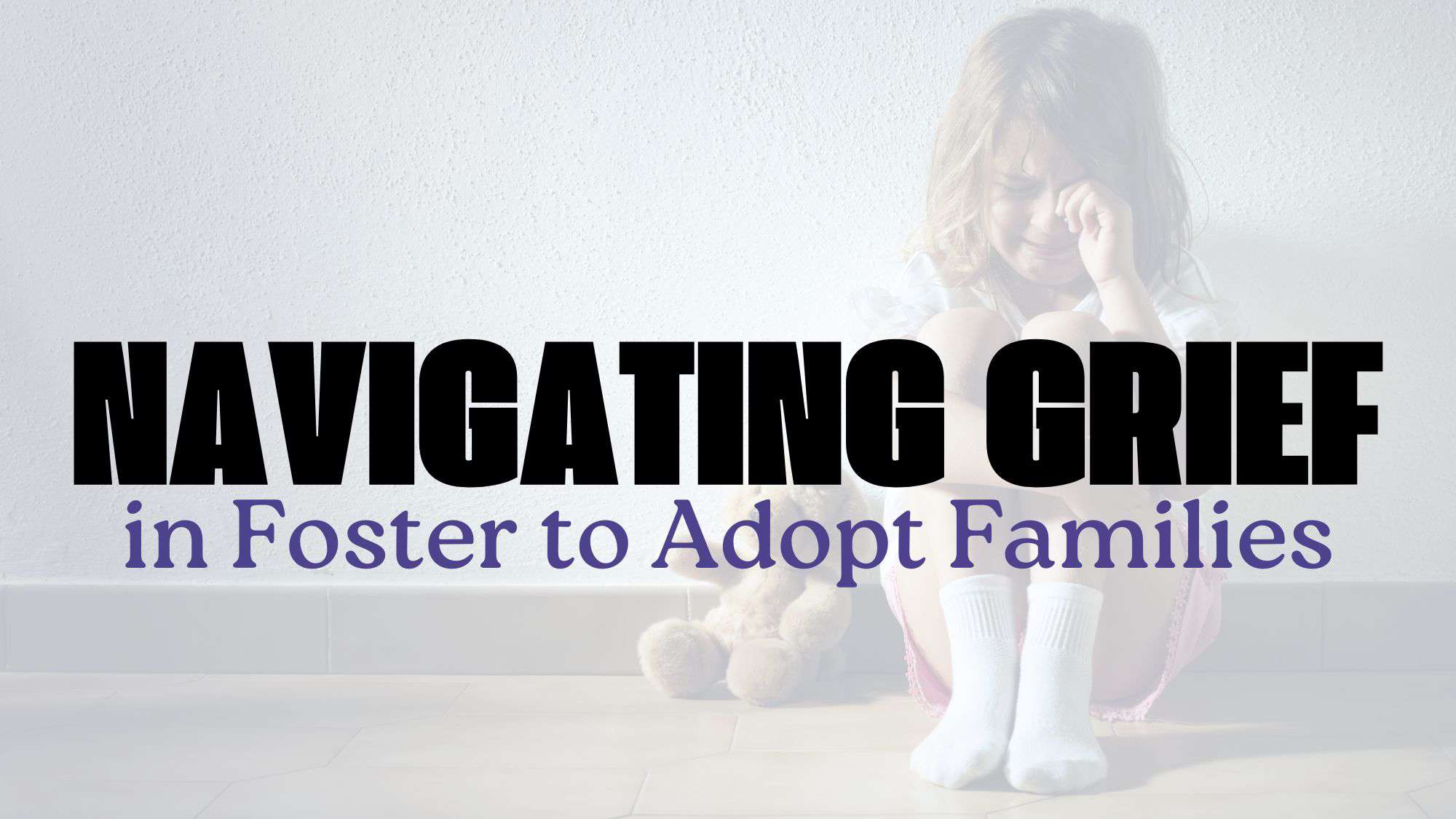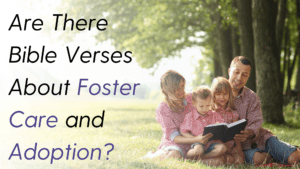“I knew I would be sad; I didn’t expect to be this angry and resentful towards my child,” a parent recounts as they try navigating grief in their foster to adopt family. It’s common for me to sit with parents who are tearful and angry during and after their foster-to-adopt journey. As a foster parent, the focus is on being a safe haven for a child. Families expect to have feelings about why foster care is needed. Many families will share how they expected there to be “some grief over the years” but were not prepared for the grief war that would erupt inside the entire family.
My child developed a routine after the initial adjustment to foster placement, and things seemed to calm down. Now that the adoption has occurred, it feels like we are going backward in behavioral outbursts. It is not just our adopted child; it’s our whole family. Everyone seems stressed out and prickly.
One mom described:
I was prepared to do therapeutic parenting and have some behaviors as a result of the transition to adoption. I guess I thought if I did the therapeutic parenting steps, I would get the therapeutic results. I expected A + B to = C in a factual timeframe. The longer the healing journey takes with the same severity of behaviors that come and go, it’s hard to not be angry and resentful. It feels like I’m angry at everyone. I’m angry at the birth family for needing foster to adopt services, I’m angry at myself for not being able to fix it for my child, I’m angry at my child for not responding the way I think they could to me, I’m angry at my spouse for not being able to make it better, I’m angry at God that He is not helping my child heal, and I’m angry that our adoption journey doesn’t look like other families who seem to be happy. I’m resentful that this child is taking away my time and energy from my other kids and the other areas of my life. I’m resentful that I’m not able to get my needs met “enough” because I’m trying to meet my child’s needs “enough.” I’m just sooooo angry. Now every time I have to stop and do TBRI, I’m instantly mad and resentful, which isn’t beneficial for therapeutic parenting. I don’t know how to not be mad. And on the days I manage not to be mad, I just cry because I’m so sad about what this adoption journey has done to our family.”
A Mother of Five
Tools for Navigating Grief in Foster to Adopt Families
Living with ongoing grief is challenging. People have every right to be hurt and angry about these things. Yet, in the midst of this storm, there is hope. Consider these tools:
Accept That Grief is Part of the Equation.
Don’t try to fight it and get rid of it. Accept it is here and allow it to be present. Note: Acceptance does not mean entertaining it or expressing it. It simply means we acknowledge its presence.
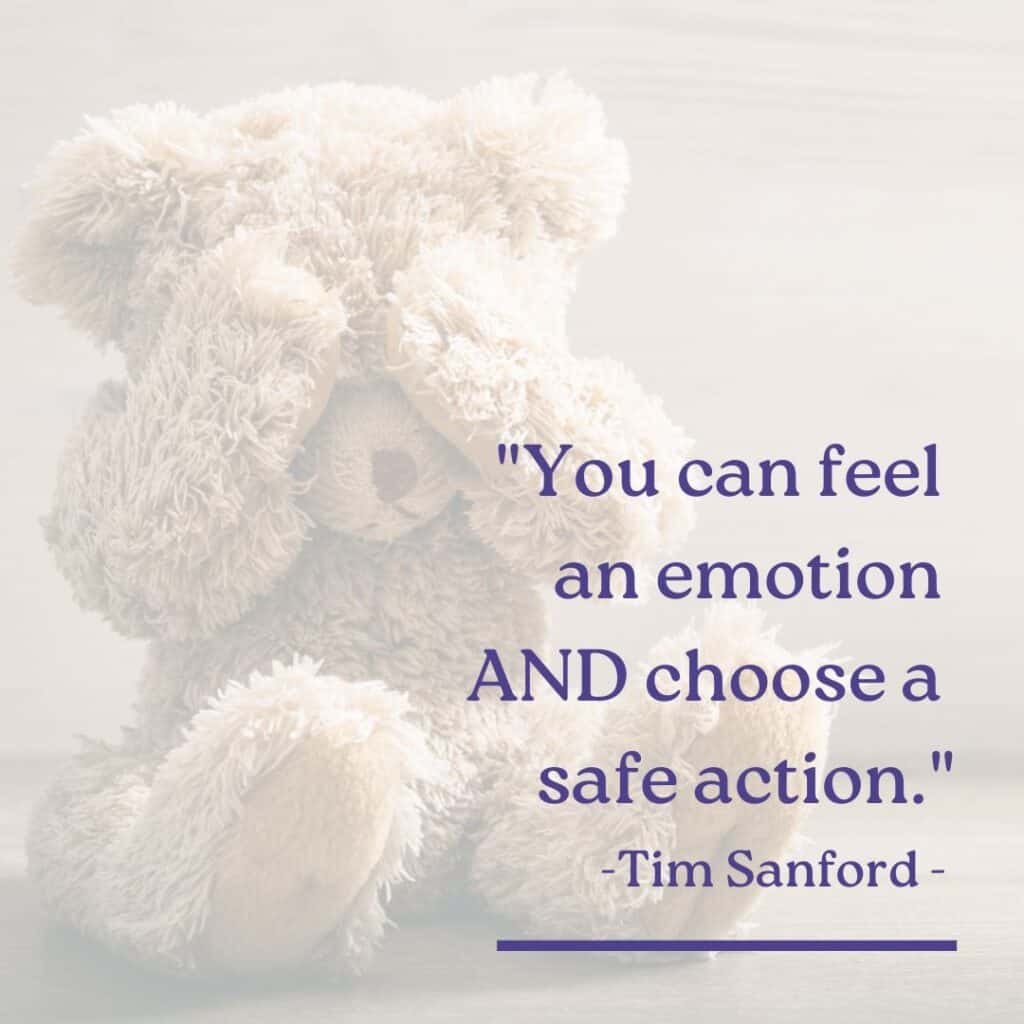
Use the Word “And.”
My great mentor, Tim Sanford, always says, “You can feel an emotion “AND” choose a safe action.” For example, I can feel angry and still do dishes without breaking them. Or I feel resentful, and I can stop to get grounded before continuing to parent.
Plan Your “Pop.”
When grief is ongoing, the emotions will be present and need to be addressed regularly. People can choose to wait for the emotions to build up and then explode when they aren’t expecting it. Or, find a regular time to intentionally let out the emotions that we know are present during this season of grief. I have one mom who has a two by four and a box of nails in her garage and goes out when the kids are at school to hammer nails into the board while verbalizing what she is angry about. Playing emotional charades as a family is another great activity.
Connect as a Spouse.
Remember, marriage is a team on the journey to a successful family. If one team member is struggling, returning to the sidelines and renegotiating the game plan is essential. Quarterbacks and receivers can’t make touchdowns by themselves. They have to support each other. A spouse often knows there is stress. They are often unaware when their spouse’s emotions have reached their limit until an explosion occurs. Choose to connect with words to your spouse before emotions take over parental behaviors.
Dial a Friend
Have a list of five people you have previously asked to be part of the support system during this year. Call one or two and ask them to offer a prayer/hug and reminder about the “why” that started the adoption journey.
A Child Grieves Too
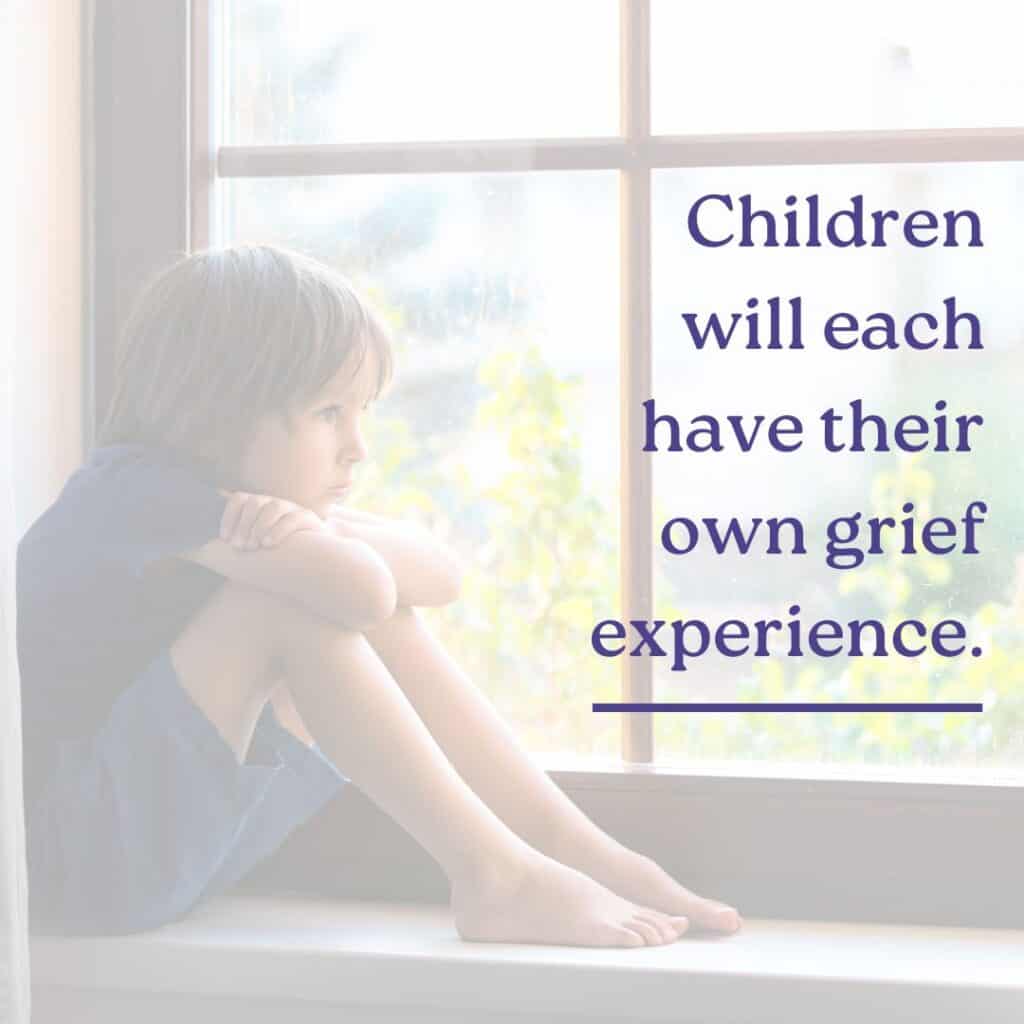
Biological, fostered, or adopted children will each have their own grief experience. A child may or may not grieve immediately after the adoption. The general thought around grief is that one cannot begin to grieve until after the event’s one-year anniversary. When the event happens, there is a shock and survival time period. One has to get through all the “firsts” (for example, a first Christmas or birthday) before going through the grieving process. Grief is a unique and individual process. The goal when grieving is not to prevent or fix it but instead recognize it when it shows up and give it acceptance space to process.
Please be aware that as the adoptive parent, you will likely not be the person your child will want to process their grief with. Having a life book that children can reference or having other age-appropriate friends who are adopted can also be helpful, especially for teens. Connecting your child with a safe adult they can talk to or having a counselor is generally beneficial. These people will most likely hear about the grief before the adoptive parent becomes aware. Here are some possible situations that cause children to grieve.
Situations a Biological Child May Grieve:
- I don’t have my parent’s attention.
- My sibling’s behaviors control everything.
- I’m embarrassed to bring my friends around my family.
- I miss “normal.”
- I miss my parents being able to attend my sports or school performances.
- I miss the peace in our house.
- I miss my alone time.
Situations That May Cause an Adopted or Fostered Child to Experience Grief
- My birth mom is not able to care for me.
- I miss my birth family/siblings/aunts/uncles/cousins.
- I miss my house, school, neighbors, and friends.
- I miss the food my mom made.
- I’m angry at my foster parents for not protecting me from having to go back to my birth family where I was hurt again.
- I feel internal chaos, rage, and sadness, and no words exist to express it.
- I don’t want to do the work of learning to be a part of a new family.
- I’m scared this new family will also hurt me at some point.
- Holidays and special vacations are not the same.
- I have to make new friends.
- I’m figuring out a “new me.”
How to Navigate Grief in Foster to Adopt Families
Be Open to Awareness.
Your child’s age will dramatically affect their transition from foster to adoption. If your child is under three years old, there are still options to develop attachment. TheraPlay is foundational. Over the age of three years, bonding with a caregiver can happen, and earned attachment may be possible. Parents will need to watch and evaluate their child’s needs regularly. TBRI parenting is highly advised. However, above all else, choose a relationship and be open to a new awareness of what a child may need.
A “Gotcha Day” Example
Consider this example: Some children enjoy their “gotcha day” as a second birthday. However, let me share a story of a fifteen-year-old young man I recently saw in my practice. He was adopted at four years old. He told me the following story:
When I was little, I liked my “gotcha day.” It was like having a second birthday. Everyone made a huge deal about it all day long. I didn’t mind because I liked my family and I enjoyed the fun things I got. As I got older, I started to realize that my “gotcha day” reminded me that my birth mom couldn’t take care of me. It’s a reminder that I had to be adopted and a yearly reminder that I have another family out there that I don’t know. The older I get, the less celebration there is.
Today is my “gotcha day” anniversary. I have been dreading it for over a week now. Wishing my family would forget or wish I could. I have so many questions about who I am and how much I am like my birth family. I stayed in my room as long as I could today without it being noticed. Everyone has come up and hugged me and said, “Happy gotcha day!” but we aren’t doing anything special. And that’s ok with me. I just feel depressed and alone, but I don’t know what I want or need. I don’t know how to tell my parents I don’t want to celebrate “gotcha day” anymore because I don’t want to hurt them. I know they care and would listen, but I don’t know what to tell them I need. I just feel lost.
Choose Relationship
Families will learn to navigate each other’s grief. The critical thing to focus on is maintaining the connection in the relationship. Take breaks when needed. Always return to repair the relationship and know the other person’s reality. There will be lots of moments of joy amid the grief. Notice the joy that is there and enjoy that moment. Grief is a season and does not last forever.
Give Safe Space
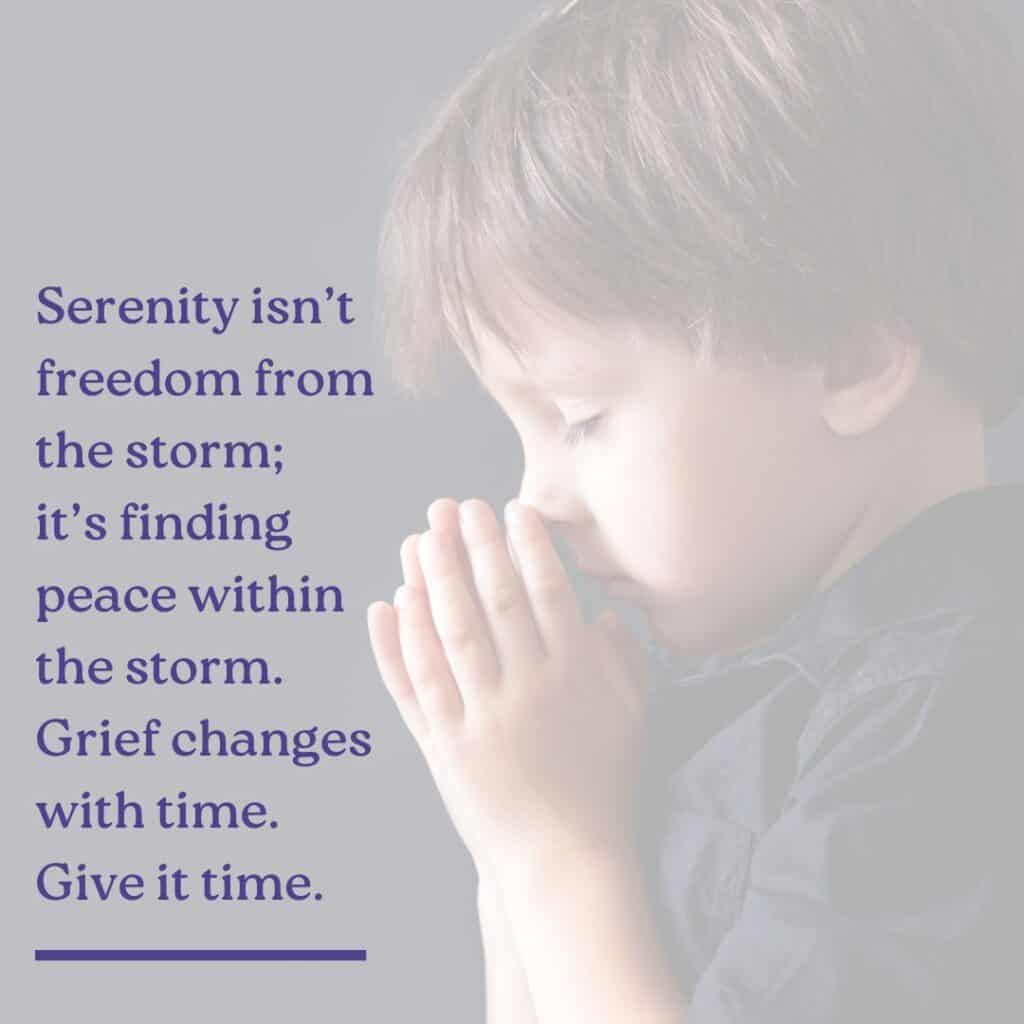
When you notice grief is present, don’t rush through it to fix it. Give grief a safe place to be heard and supported. Allow people space to feel their emotions safely without trying to get a resolution. A couple of helpful questions at this moment for parents are “Tell me more,” or “What does acceptance of this emotional look like right now?” As we accept the presence of the grief emotion and use the “and” word to move towards action, be aware of the need for calm breathing. Often just sitting in that safe place with a person and breathing with them for a while is enough for peace to come.
I love a quote from my old recovery coin: “Serenity isn’t freedom from the storm; it’s finding peace within the storm. Grief changes with time. Give it time.”









